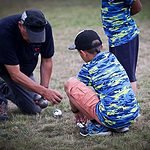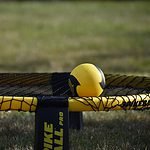If you're aiming to make a mark in competitive Frisbee tournaments, it's essential you start by thoroughly understanding the rules and adapting your gameplay accordingly. Sharpening your throwing and catching skills will certainly give you an edge, but don't overlook the importance of building a cohesive team. Coordination and communication can be your greatest assets on the field. As you consider these initial tips, remember that there's more to explore about strategizing and preparing both physically and mentally. Curious about how these elements can transform your competitive play? Let's dive deeper into the strategies that could elevate your game to the next level.
Research Tournament Rules

To excel in competitive Frisbee tournaments, you must thoroughly understand the specific rules and regulations, as they can greatly impact your team's strategy and performance. Different tournaments set their own rules regarding game format, scoring, timeouts, and other gameplay aspects. These can vary greatly depending on the tournament's level, the governing body, and the particular guidelines established by the organizers.
It's important to research these tournament rules well in advance. This preparation prevents any misunderstandings or penalties that could arise during gameplay. Knowing the rules inside out lets you adapt your strategies effectively and ensures that your team can make the most of each game situation within the established framework.
Moreover, being knowledgeable in the rules can provide a competitive edge. You'll be able to anticipate game developments and opponent moves, adjusting your tactics on the fly to maintain the upper hand. Don't overlook the importance of this step; it's as critical as physical training. Invest time in studying the rulebook and perhaps even simulate different scenarios in practice sessions. This way, when you step onto the field, you're not just ready to play—you're ready to dominate.
Improve Your Frisbee Skills
After mastering the rules, it's time to focus on honing your Frisbee skills to elevate your competitive performance.
You'll need to work systematically on several key areas, starting with your throwing accuracy and distance. These are essential to making successful plays and can't be overlooked. Practice consistently with different throws like the backhand, forehand, hammer, and scoober to add versatility to your game. Each technique has its strategic uses, depending on your position on the field and the game situation.
Next, focus on your catching technique. Being a reliable receiver means ensuring that you can secure the Frisbee under various conditions, whether you're stationary or on the move. This skill is pivotal during high-pressure moments in tournaments.
Developing your defensive skills is equally important. Learn the art of marking, forcing, and positioning to disrupt your opponents' game plan effectively. This requires not only physical agility but also sharp mental acumen.
Enhance your field awareness to understand better where you're in relation to other players, the disc, and the end zones. This strategic understanding will help you make smarter plays and communicate more effectively on the field, without necessarily coordinating as a team.
Build Team Cohesion

To excel in competitive Frisbee tournaments, building team cohesion is essential. Start by fostering trusting relationships through regular, focused team practices that not only sharpen skills but also enhance interpersonal connections.
Additionally, make it a point to celebrate individual contributions, as this recognizes personal efforts and motivates everyone towards collective success.
Foster Trusting Relationships
Building trusting relationships within your team is essential for fostering cohesion and enhancing performance in competitive frisbee tournaments. When you play Ultimate Frisbee, trust lets you rely on teammates during crunch times, ensuring smooth plays and strategic moves.
Invest in team bonding and maintain open channels for communication. These efforts solidify the trust foundation critical for overcoming in-game challenges. Here's a quick guide to help you gauge where your team stands in building trust:
| Aspect | Importance | Action Item |
|---|---|---|
| Communication Skills | High | Regular team meetings |
| Reliance on Skills | Critical | Skill-sharing sessions |
| Handling Setbacks | Essential | Stress management |
| Decision Making | Key | Strategic workshops |
Focus on these areas and you'll see your team's dynamics transform, ready to tackle any tournament with confidence.
Regular Team Practices
Regular team practices are key to forging strong cohesion, enhancing communication, and perfecting game strategies among your players. To maximize effectiveness, make sure these sessions are consistent, allowing each member to deeply understand the playing styles, strengths, and weaknesses of their teammates. This understanding is vital for developing synchronized set plays and game plans tailored to your team's unique capabilities.
Frequent practices will also build trust and coordination, essential for seamless execution during competitive matches. By practicing together regularly, your team will enhance their ability to anticipate each other's moves on the field, leading to improved decision-making and overall performance. Remember, the success of your strategies in tournaments hinges on the cohesion developed through these regular team practices.
Celebrate Individual Contributions
While regular team practices hone your group's coordination, it's equally important to acknowledge and celebrate each player's unique contributions to strengthen team cohesion. After your first game, take a moment to recognize the diverse talents each member brings. This not only boosts morale but also enhances performance by showing everyone that their efforts are valued.
Here's a simple way to start:
| Player | Contribution | Impact on Team |
|---|---|---|
| John | Exceptional catching | Boosts defense |
| Lisa | Strategic plays | Enhances tactics |
| Alex | Consistent scoring | Increases points |
Encourage open communication and feedback. Highlighting these contributions fosters a supportive environment where everyone feels integral to the team's success.
Develop a Game Strategy

To excel in competitive Frisbee tournaments, you'll need to thoroughly analyze your opponents' tactics. This means observing their past games to identify patterns and weaknesses that your team can exploit.
Simultaneously, work on optimizing team coordination to guarantee that every member knows their role and executes plays with precision.
Analyze Opponent Tactics
Before stepping onto the field, it's essential to analyze your opponents' tactics by reviewing game footage and scouting reports, ensuring you understand their strengths and weaknesses. Going into the tournament, you'll need to tailor your strategy based on these insights. Identify where your team's strengths align with their vulnerabilities.
Focus on key matchups and specific areas of the field where you can gain an advantage. As the tournament progresses, keep an eye on any shifts in your opponents' strategies and adjust accordingly. Communication is key; make sure your team is on the same page and ready to adapt.
This proactive approach will enhance your chances of dominating the competition and securing victory.
Optimize Team Coordination
Having analyzed your opponents' tactics, it's now essential to focus on optimizing your team's coordination and developing a robust game strategy.
Assign specific roles and responsibilities to each player, ensuring everyone knows their part in the team's success.
Practice set plays and defensive strategies to effectively counter your opponents.
Utilize team meetings to adapt your game plan and make strategic adjustments based on the team's performance and the opponents' tactics.
Remember, at Universe Point, every play counts, and your ability to execute your strategy flawlessly under pressure can make the difference.
Trust and teamwork are vital; they're what'll carry you through intense moments and lead to success in competitive Frisbee tournaments.
Focus on Physical Fitness
Physical fitness is essential for excelling at ultimate frisbee tournaments, where endurance and agility play pivotal roles on the field. To boost your game for the next time, focus on enhancing your cardiovascular fitness. This isn't just about running longer; it's about sustaining higher levels of intensity throughout the day. Incorporate interval training into your regimen to build stamina that matches the tournament's demands.
Additionally, don't overlook strength training. You'll need robust core and leg muscles to make those explosive jumps and sprints. Mix in exercises like squats, planks, and lunges to build muscle strength that can withstand the rigorous physical challenges of the game. This won't only improve your performance but also bolster your resilience against potential injuries.
Speaking of injuries, integrating flexibility and mobility workouts into your training schedule is critical. Regular stretching and mobility exercises enhance your range of motion and reduce the risk of getting sidelined by strains and sprains.
Lastly, remember that your physical efforts must be backed by proper nutrition. Fueling your body with the right nutrients before, during, and after tournaments is essential for maintaining energy levels and accelerating recovery. Keep this holistic approach to fitness, and you'll see marked improvements in your game.
Register Early

To guarantee your team's spot in a competitive frisbee tournament, it's crucial to register early. Early registration not only secures your place but also often comes with a financial perk—many tournaments offer early bird discounts. This can greatly reduce your overall expenses, making it an economically smart move. Let me know if you're eyeing a particular tournament; I can help you keep track of these opportunities.
Furthermore, registering early allows your team to strategically plan your schedule and logistics. Knowing your tournament dates well in advance enables you to arrange travel, accommodation, and practice sessions without the last-minute rush. This organized approach reduces stress and allows for a more focused preparation period.
Be aware, popular tournaments fill up quickly. If you wait too long, you might find yourself paying higher fees, or worse, missing out entirely due to maximum capacity being reached. Early registration isn't just a recommendation; it's a strategic move to make sure you're in the game rather than on the sidelines.
Prepare Mentally
After securing your spot with early registration, focus next on sharpening your team's mental game for competitive success. Mental toughness isn't just a bonus; it's a necessity for thriving in the intense atmosphere of competitive frisbee tournaments. Here's how you can elevate your mental preparation:
- Practice Visualization: Imagine executing perfect plays and visualize winning points during practice sessions. This technique enhances your mental imagery, which is essential for performance in real matches.
- Develop Resilience: Learn to bounce back from setbacks quickly. Whether it's a bad throw or a point lost, maintaining composure and focus is key. Push past the frustration and channel your energies into the next play.
- Engage in Positive Self-Talk: Boost your confidence by reminding yourself of your skills and past successes. Positive affirmations can strengthen your mind against doubts and anxiety, helping you stay centered and confident during the game.
- Manage Pre-Game Nerves: Recognize signs of nerves or anxiety in yourself and your teammates. Employ relaxation techniques such as deep breathing or listening to calming music before the game to make sure everyone performs at their best.
Implementing these strategies will prepare you and your team mentally, setting you up for success in the tournament.
Conclusion
As you immerse yourself into competitive Frisbee tournaments, remember that mastering the game is like tuning a fine instrument; every detail matters.
Research the rules, hone your skills, and solidify your team's unity. Strategically develop your game plan and keep your body in top shape.
Don't forget to register early and prepare mentally. With these strategies, you're not just participating—you're setting the stage for victory.
Embrace the challenge, and let your preparations guide you to success.





